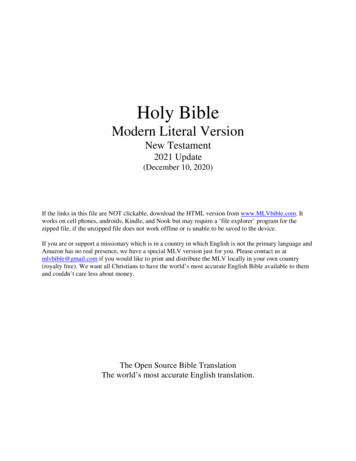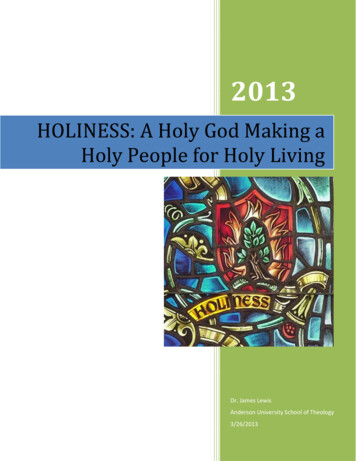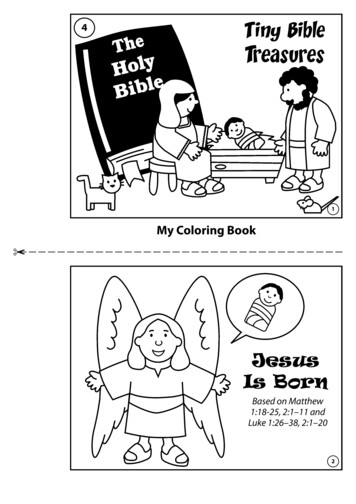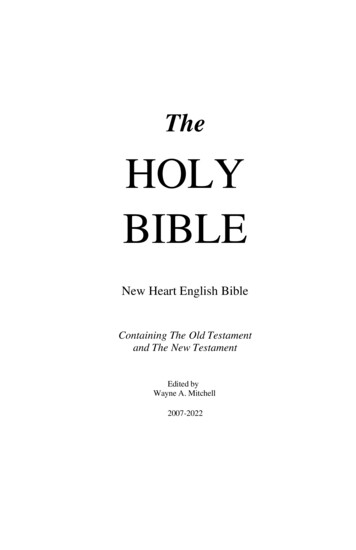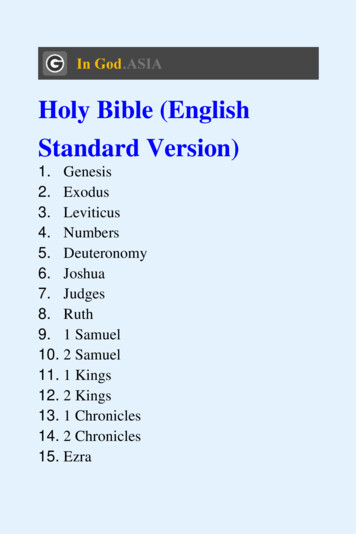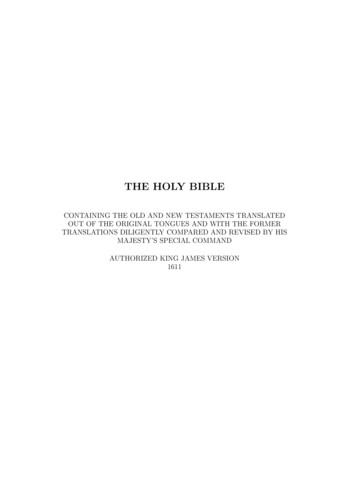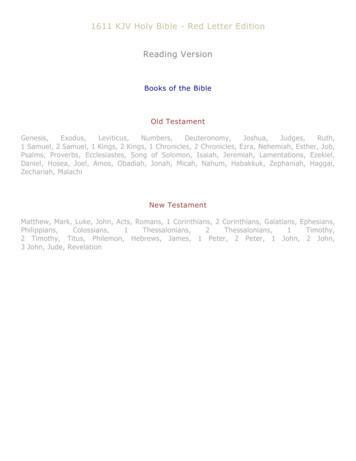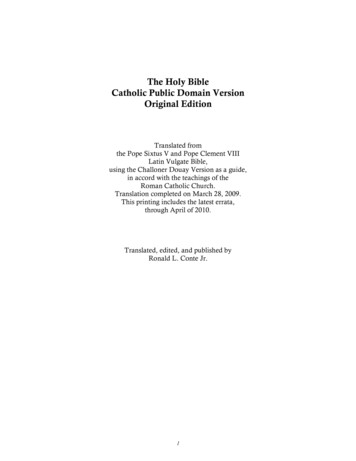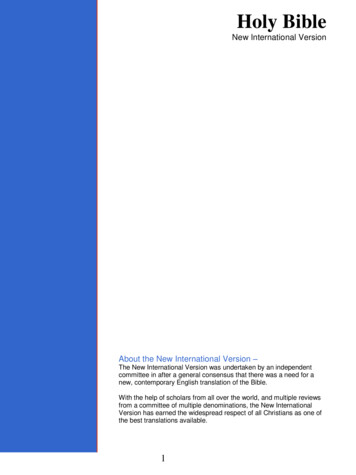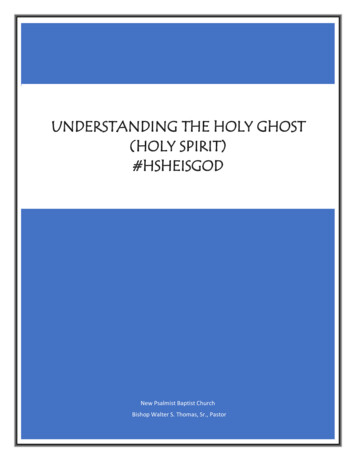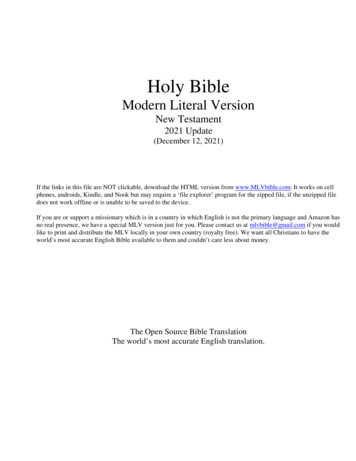
Transcription
Holy BibleModern Literal VersionNew Testament2021 Update(December 12, 2021)If the links in this file are NOT clickable, download the HTML version from www.MLVbible.com. It works on cellphones, androids, Kindle, and Nook but may require a ‘file explorer’ program for the zipped file, if the unzipped filedoes not work offline or is unable to be saved to the device.If you are or support a missionary which is in a country in which English is not the primary language and Amazon hasno real presence, we have a special MLV version just for you. Please contact us at mlvbible@gmail.com if you wouldlike to print and distribute the MLV locally in your own country (royalty free). We want all Christians to have theworld’s most accurate English Bible available to them and couldn’t care less about money.The Open Source Bible TranslationThe world’s most accurate English translation.
Presented to:By:
Table of Contents (TOC) for the electronic Modern Literal Version (MLV):Matthew 1 . 2 . 3 . 4 . 5 . 6 . 7 . 8 . 9 . 10 . 11 . 12 . 13 . 14 . 15 . 16 . 17 . 18 . 19 . 20 . 21 . 22. 23 . 24 . 25 . 26 . 27 . 28Mark 1 . 2 . 3 . 4 . 5 . 6 . 7 . 8 . 9 . 10 . 11 . 12 . 13 . 14 . 15 . 16Luke 1 . 2 . 3 . 4 . 5 . 6 . 7 . 8 . 9 . 10 . 11 . 12 . 13 . 14 . 15 . 16 . 17 . 18 . 19 . 20 . 21 . 22 .23 . 24John 1 . 2 . 3 . 4 . 5 . 6 . 7 . 8 . 9 . 10 . 11 . 12 . 13 . 14 . 15 . 16 . 17 . 18 . 19 . 20 . 21Acts: The Book of Conversions 1 . 2 . 3 . 4 . 5 . 6 . 7 . 8 . 9 . 10 . 11 . 12 . 13 . 14 . 15 . 16 .17 . 18 . 19 . 20 . 21 . 22 . 23 . 24 . 25 . 26 . 27 . 28Romans 1 . 2 . 3 . 4 . 5 . 6 . 7 . 8 . 9 . 10 . 11 . 12 . 13 . 14 . 15 . 161 Corinthians 1 . 2 . 3 . 4 . 5 . 6 . 7 . 8 . 9 . 10 . 11 . 12 . 13 . 14 . 15 . 162 Corinthians 1 . 2 . 3 . 4 . 5 . 6 . 7 . 8 . 9 . 10 . 11 . 12 . 13Galatians 1 . 2 . 3 . 4 . 5 . 6Ephesians 1 . 2 . 3 . 4 . 5 . 6Philippians 1 . 2 . 3 . 4Colossians 1 . 2 . 3 . 41 Thessalonians 1 . 2 . 3 . 4 . 52 Thessalonians 1 . 2 . 31 Timothy 1 . 2 . 3 . 4 . 5 . 62 Timothy 1 . 2 . 3 . 4Titus 1 . 2 . 3PhilemonHebrews 1 . 2 . 3 . 4 . 5 . 6 . 7 . 8 . 9 . 10 . 11 . 12 . 13James 1 . 2 . 3 . 4 . 51 Peter 1 . 2 . 3 . 4 . 52 Peter 1 . 2 . 31 John 1 . 2 . 3 . 4 . 52 John3 JohnJudeRevelation 1 . 2 . 3 . 4 . 5 . 6 . 7 . 8 . 9 . 10 . 11 . 12 . 13 . 14 . 15 . 16 . 17 . 18 . 19 . 20 . 21 .22
4
Table of Contents for the Modern Literal Version(book form):Simple Reading Schedule . . . . . . . . . . . . . . . . . . . . . 5Definitions . . . . . . . . . . . . . . . . . . . . . . . . . . . . . . . . . 6Copyright . . . . . . . . . . . . . . . . . . . . . . . . . . . . . . . . . 9Preface . . . . . . . . . . . . . . . . . . . . . . . . . . . . . . . . . . 10English Words to one Greek Word . . . . . . . . . . . . . 13Greek History During N.T. Times . . . . . . . . . . . . . . 13Evangelism & Truth. . . . . . . . . . . . . . . . . . . . . . . . . 13Introduction to the Good News . . . . . . . . . . . . . . . . 13Matthew . . . . . . . . . . . . . . . . . . . . . . . . . . . . . . . . . 16Mark . . . . . . . . . . . . . . . . . . . . . . . . . . . . . . . . . . . . 47Luke . . . . . . . . . . . . . . . . . . . . . . . . . . . . . . . . . . . . 68John . . . . . . . . . . . . . . . . . . . . . . . . . . . . . . . . . . . . 101Harmony of the N.T. Conversions. . . . . . . . . . . . . 127Acts . . . . . . . . . . . . . . . . . . . . . . . . . . . . . . . . . . . . 127Introduction to the Christian Letters . . . . . . . . . . . 158Romans . . . . . . . . . . . . . . . . . . . . . . . . . . . . . . . . . 1581 Corinthians . . . . . . . . . . . . . . . . . . . . . . . . . . . . . 1712 Corinthians . . . . . . . . . . . . . . . . . . . . . . . . . . . . . 182Galatians . . . . . . . . . . . . . . . . . . . . . . . . . . . . . . . . 190Ephesians . . . . . . . . . . . . . . . . . . . . . . . . . . . . . . . 195Philippians . . . . . . . . . . . . . . . . . . . . . . . . . . . . . . 200Colossians . . . . . . . . . . . . . . . . . . . . . . . . . . . . . . . 2041 Thessalonians . . . . . . . . . . . . . . . . . . . . . . . . . . .2 Thessalonians . . . . . . . . . . . . . . . . . . . . . . . . . . .1 Timothy . . . . . . . . . . . . . . . . . . . . . . . . . . . . . . .2 Timothy . . . . . . . . . . . . . . . . . . . . . . . . . . . . . . .Titus . . . . . . . . . . . . . . . . . . . . . . . . . . . . . . . . . . .Philemon . . . . . . . . . . . . . . . . . . . . . . . . . . . . . . . .Hebrews . . . . . . . . . . . . . . . . . . . . . . . . . . . . . . . .James . . . . . . . . . . . . . . . . . . . . . . . . . . . . . . . . . . .1 Peter . . . . . . . . . . . . . . . . . . . . . . . . . . . . . . . . . .2 Peter . . . . . . . . . . . . . . . . . . . . . . . . . . . . . . . . . .1 John . . . . . . . . . . . . . . . . . . . . . . . . . . . . . . . . . .2 John. . . . . . . . . . . . . . . . . . . . . . . . . . . . . . . . . . .3 John. . . . . . . . . . . . . . . . . . . . . . . . . . . . . . . . . . .Jude . . . . . . . . . . . . . . . . . . . . . . . . . . . . . . . . . . . .Revelation . . . . . . . . . . . . . . . . . . . . . . . . . . . . . . .Talking to Others about the MLV . . . . . . . . . . . . .Verb, Tenses, Moods . . . . . . . . . . . . . . . . . . . . . . .Constantly Changing Wording . . . . . . . . . . . . . . .To Foreign Language Translators . . . . . . . . . . . . .UK English Dictionary . . . . . . . . . . . . . . . . . . . . .Bible Accuracy Chart. . . . . . . . . . . . . . . . . . . . . . .Why the Byzantine Majority Text? . . . . . . . . . . . .The MLV Wording Statistics. . . . . . . . . . . . . . . . .New Koine Greek Textbook Series . . . . . . . . . . . 64265265265266268269282Simple Reading ScheduleThis is a simple reading schedule designed to be followed for 20 minutes a day over a 2-month period. Empty your mind. ReadGod’s Word like a child would for the first time. Never read it with preconceived ideas or thoughts or to prove something! Rememberto pray. Don’t try to understand everything. Note what you don’t understand and move on. Reread those notes later and they may makemore sense. This arrangement is for better understanding by letting books build on each other. It is arranged roughly in chronologicalorder. Use Sundays to catch up on days you could not spend 20 minutes with the Word of God. If you have never read the Bible, alwaysstart with the New Testament. The New Testament is what you will be judged by, not the Old Testament. It is not wise to read the OldTestament and New Testament together; the O.T. Jewish Law maybe confused with N.T. teachings. Spend the first Monday readingthe Preface and other non-bible sections to familiarize yourself with the MLV’s style of translation.The Modern Literal Versions strongest feature is its consistency in translating the original Greek word into the same English word(s)every time and not using the same English word for multiple Greek words, so you should read the Modern Literal Version once allthe way through and do not use any other translation during this time to gain knowledge from this uniformity. Then you too willunderstand why so many of the emails to us are ‘I have learned so much just reading the MLV once,’ or similar.MondayNon-Bible MaterialMatthew 5-8John 1-4Luke 4-7Acts 1-4Acts 25-281Cor 16 - 2Cor 6Philippians 1-4Hebrews 10-13Revelation 21-22TuesdayMark 1-3Matthew 9-12John 5-7Luke 8-10Acts 5-8James 1-52Cor 7-13Colossians 1-41 John - 3 JohnWednesdayMark 4-7Matthew 13-16John 8-11Luke 11-14Acts 9-121Th-2ThRom 1-51Pet-2PeterRevelation 1-3ThursdayMark 8-11Matthew 17-21John 12-16Luke 15-18Acts 13-16Galatians 1-6Rom 6-11Jude - 1Tim 4Revelation 4-9FridayMark 12-14Matthew 22-25John 17-21Luke 19-21Acts 17-201Cor 1-8Rom 12-161Tim 5- Heb 2Revelation 10-14SaturdayMark 15-Matthew 4Matthew 26-28Luke 1-3Luke 22-24Acts 21-241Cor 9-15Ephesians 1-6Hebrews 3-9Revelation 15-20To read the New Testament as the events happened, go to Mark 1 and follow the {Harmony of the New Covenant} sections.
6Definitions TOC* Asterisks are used for denoting words listed in the ‘Definitions’section below. These are for the few instances where the Englishtranslation does not lend itself to a satisfactory meaning of theunderlying Greek word. In addition, we use an asterisk to denote thedifference between one English word that is being used for twodifferent Greek words (for example, see Age* below.) Thissubstantially aids word studies and concordance look ups. Degree signs are used to denote plural you and commandswhere a plural subject is not clearly stated (imperative 2nd person pluralmost often).- Hyphens are used in those places where two English words comefrom a single Greek word. It is of particular benefit to Bible studentswho wish to cross-reference words to the MLV concordance and Greeklexicon.Italicized words are words not found directly in the Greek butimplied by the context, needed to help show action, tense or expansionof the meaning of words that the literal English does not convey,remove the possible appearance of a contradiction, etc.Since the MLV is literal, not ‘thought-for-thought,’ supplied wordsare of significant assistance for those phrases which are exceptionallydifficult to read. By pointing out these words using italics, the readerhas the option to disregard them.A, An (indefinite articles) are always supplied words in English butnot marked with italics in the text.Age* is Strong’s Dictionary number 2244 (hereafter, we willabbreviate as G2244 for electronic and book uniformity). It is used invery much the same way we think of a person’s ‘age.’ The other ‘age,ages’ without the *, is for a period of time. This ‘age’ is also translatedas ‘world’ 22 times. Context determines which word should be used.Admonish means to ‘instruct with warning’ G3560.And from G2532 is used the way we use a comma in lists. We havekept these ‘and’ and any other Greek words that we could, even if theyare not ‘English-teacher approved.’Angel see Messenger.Apostle is a transliterated word. The English equivalent would be‘one sent’ with the meaning of ‘one sent on a mission.’ Apostle hasbeen kept when speaking of Jesus’ apostles. Ambassador is the otherrendering of this Greek word and truly a better translation of G652.Ambassador* see Apostle.Appointed* is G5087 which literally is ‘placed’ but we don’t use‘placed’ that way in English. The other ‘appointed’ without the * isfrom compounds of G5021 that means ‘set in rank’, i.e., ‘command orappoint.’Assuredly is also ‘amen’ which roughly means ‘so be it.’ Jesus saidthis (sometimes twice), at the beginning of his teachings. G281.Baptism see Immersion.Be, is, are, was, were, being, been verbs are generally ‘helperwords’ added to other English verbs, adjectives or rarely nouns, totranslate some Greek verbs. When they are not ‘helper words’ thenthey are from compounds of G1510 (‘be, is, was.’) and sometimes butrarely G2192 (‘have, hold, help’) and G5225 (denoted as be*, is*,was*, were* being*; exist, possess).Because is probably the largest improvement in the MLV over allother translations. In translations dating from 1523 even to now, theEnglish word ‘for’ has been used for words that should have alwaysbeen translated as ‘because,’ G473, G3754, or ‘because of,’ G1223,G1360, G1752, G5484. Another such bad ‘for’ translation is G5228,‘on behalf of’. Jesus did not die for us; he died on behalf of us. SeeFor, also.Believe, belief, faith, faithful, entrust in verb, adjective, adverb,or noun forms, are some of those very few Greek words (G4100,G4102, G4103) which carry more meaning than the Englishequivalent. These words also carry the meaning: ‘to obey,’ ‘to bepersuaded’, even the whole process of salvation as in Acts 19. In theGreek language, the antonym of ‘to believe’ is ‘to be disobedient’(G544). See John 3:36 for both words together in the same verse.Believe in literally means ‘believe into,’ in the majority of allplaces in the New Testament. A similar expression is found in Mat28:19 ‘into the name’, Acts 2:38 ‘into the forgiveness’.Belt is impossible to contextually distinguish; it could be a simplebelt, or a complex series of leather straps used to hold tools, weapons,money or a belt of armor. The girdle (belt) was worn on the hips, orwaist, or across the chest. G2223.Blessed* see Gracious* below also. G3107.Bowels are where the Greeks thought the emotions were born. Thisis where we get expressions such as ‘desires of the heart,’ ‘gut feeling,’‘nervous stomach’ and so on. G4698.Brethren is specifically ‘brothers’ but used more often to describekinfolk in the N.T., whether by family ties or by the blood of Jesus.Though translated from a Greek masculine noun, G80, the wordincludes males and females in context.Bring* and other verb forms, can be translated as ‘lead,’ G71 andits compounds. This was done primarily for concordance look-ups.By is the literal from G5259 ‘hypo’ (also ‘under’); all others are thelast choice of substitutes for the Dative case or various prepositionsbecause we just don’t speak the way the literal would be rendered. Theinteresting fact from this is that ‘by faith’ or ‘by the faith’ was nevertruly ‘God said’. Oh well, the theologians will have to adjust.Call* and other verb forms are from G3004 (say, speak) and mightbe better as ‘is spoken of as’ or ‘is spoken to be’ and is different fromthe compounds of the synonyms of G2564 (invited, called, surnamed)and G3687 (is named). All ‘called’ words used by other varioustranslations from the Greek words for ‘summon’ or ‘shout out’ havebeen rendered properly in the MLV. So every time you see ‘called’ itcan be ‘invited’ in the MLV same as with all the Greek compoundwords.Centurion*, used in Mark, is simply the Latin version of the wordsince he wrote to a Gentile audience.Centurions were military commanders of over 100 soldiers. Theywere highly esteemed individuals of society. (G2763, Latin root;G1543, Greek.)Charity in the MLV does not mean ‘money.’ It may include moneybut literally means ‘good, merciful or kind acts.’ G1654Christ is a transliterated Greek noun G5547, used like anadjective, that would translate as ‘anointed’ or ‘anointed one’; Messiahis the Hebrew translation.Church, see Congregation* below.Class (a noun) is the priestly service limited to a stated series ofdays. G2183. This is not to be confused with ‘class’ (a verb), which isfound at 2 Cor. 10:12. G1469.Cohort is a Roman military term used to describe a group of 600soldiers. G4686.Come* and its other verb forms, would literally be ‘become’ orpossibly ‘come to be’ but we just don’t speak that way. G1096.Coming (as in Second Coming), G3952, has been translated moreproperly as ‘presence.’Commanders were military commanders of over 1000 soldiers.G5506Congregation(s)* was the original translation by Tyndale in thefirst English translation from the Greek and then later changed to‘church’ by the Reformed Protestants in the Geneva Bible, and is aman-made word. The word ‘church’ was then perpetuated by theCatholic Church and Church of England up until today and is nowused in most translations simply because of tradition. This man-madetradition has been used over the centuries to promote a ‘church’ ratherthan the Lord’s ‘congregation’ of believers. The word in context is nota name but a description of ownership, or simply a local congregationlocated in some area. The word could be translated ‘assembly.’ InModern English, most think of ‘church’ as a building. The originalGreek word, even in the Bible, carries no special reverence. It is used
7to describe Jews, a mob, a local congregation, and the congregation offaithful, obedient believers worldwide as in Matthew 16:18, Acts 2:47,called the one body in Eph. 4:1-6, Eph. 5:23 and others. Some havefollowed the etymology, not its daily use, as ‘the called out’. Thiswould be like saying a ‘pineapple’ is an ‘apple produced by a pinetree.’ The word was in use in all Greek writings and meant some formof ‘leaving your home to congregate elsewhere, generally in public fortown announcements.’ (G1577).Consequently* is used to translate a couple Greek particles, G686and G687. Consequently is not exactly ‘therefore’ in English. It meansthat the previous statement is probably so or will become so.Container(s). The Bible uses Hebrew and Greek measurements,such as ‘cor’ which is a measurement of volume equal to about 90gallons. We rendered these words as volume the word ‘container.’For example, ‘a ninety-gallon-container.’This was done so we wouldnot have to footnote every mention of these words; see Luke 16:7.Covenant(s)* can be translated as ‘agreement,’ ‘contract,’‘testament’ or ‘will’ as in the expression ‘Last Will and Testament.’The underlying Greek word, G1242 and its compounds were translateduniformly as ‘covenant’ because ‘testament’ has no verb forms inEnglish. It could refer to the Old or New Testament or Covenant, orjust a simple agreement, depending on the context. The Old Testamentlaw was until the death of Jesus and the New Testament law is afterHis death (see Hebrews 9-10 and Galatians 4:4). The entire letter to theHebrews deals with why Christians are no longer bound by the laws ortraditions of the Old Testament. The events recorded in the Gospelsand the first chapter of Acts were actually part of the Old Covenantwith God.Cubit is a forearm’s length. About 20-21 inches depending ofwhich cubit measurement was common to that area. G4083.Die*, died* literally translated are ‘ended.’ G5053.Deacon(s) see footnote in 1 Timothy 3.Denarius is a coin of the Roman currency system which we haveretained in the MLV translation. Plural is denarii. The various otherdenominations are given here a rough comparison to Modern DayAmerican currency.1. A denarius was equivalent to a day’s wage of the normalworking class. It was a silver coin with Caesar’s face on it. G1220.2. Two drachmas was worth about 4 denarius, translated as ‘fourdenarii.’ G1323.3. A lepton was a bronze coin, translated as ‘bronze-coin.’ Two ofthese is equal to an Assarion or Quadran which are copper coins worththe cost of a dove or two sparrows, which is about a couple mouthfulsof food. Assarion and Quadran are translated as ‘copper-coin.’ About50 cents in US money. G3016.4. Mina which is translated as ‘200 denarius-coin’ is about 80% ofa year’s salary in modern terms. In context it probably meant a wholeyears wage. G3414.5. Slater was a coin equal to two drachmas or four denarii,translated as ‘four-denarii coin.’ G4715.6. Talant is not a coin but actually about 75 pounds of silver. Equalto about 1 million dollars in US money today which is roughly 6000denarii coins. Talant has nothing to do with the English word ‘talent’which was how the Greek word, G5007, was erroneously transliteratedin various other translations. This has lead to much confusion and iskept in other translations due to tradition.Devil was changed to ‘the Slanderer’ in the 2013 version, is backin 2015. The Greek word is an adjective used as a noun, atransliteration of Hebrew, which has a perfect English equivalent ‘aslanderer.’ This Greek word is where we got ‘diabolical.’ The Bibleeven uses the Slanderer and the Adversary (previously rendered Satan)together in Rev. 12:9 and 20:2.Different as it occurs six times in the MLV is from the Greek word,G2087, which is translated as ‘other’ or ‘another.’ In context, it mightmean something added as opposed to something different or opposite.Disobedience* is the result of a ‘refusal to hear,’ or more subtly arefusal to take in what you hear. G3876. The other disobedience(without the *) is the end result of ‘disbelieve.’ G543.Divine* is the only ‘divine’ that literally comes from the base word‘God.’ G2304 and G2316.Do, does, did, are always a supplied word in the MLV 2020upward, but not marked as such. Do, Does, Did, are used primarily inquestions or with the words, Not or Never.Do*, does*, doing*, did* are all from G4160 (mostly) and itssynonym G4238 or compound words from these Greek words. The‘do’ word can be translated as ‘practice’. Many false teachings andpoor Bible knowledge stems from the non-use of the word ‘practice’in the KJV and ASV translations.Fallen-asleep was used by Jesus and then Paul to mean dead ordeath in most instances. G2837.For is a preposition that has no true Greek equivalent. ‘To’ is theliteral translation in all places in the Modern Literal Version. Asterisk(*) versions are listed below. The conjunction ‘for’ used in othertranslations, which means ‘because, because of, in or on behalf of,’ aretranslated as such in the MLV.*For represents the Greek preposition G1519 (eis), that is literallytranslated as ‘into,’ ‘to’ or ‘toward.’ It never means ‘because of.’ Notranslation has ever translated ‘eis’ as ‘because of.’ Sometimes‘leading toward’ works very well to get the meaning across and hasbeen used by many translations in some places. This prepositionexpresses forward action in the Greek verb where the English word‘for’ can be used with verbs of actions past or future. Again, all Greekwords in the Modern Literal Version that mean ‘because’ are translatedas ‘because.’False*, only exist because the MLV is computerized and the word'false' and 'true' are reserved words in programming languages. So the* was added to fix programming errors in computerized quality checks.For* represents the Greek word G1063 (gar). It is a conjunctionwith no exact English equivalent. It is a mild form of ‘because.’Forever, forevermore represent idiom of literally ‘into the ages’and ‘into the ages of the ages’.Forgive* a verb is from the verb form of the Greek noun translatedas ‘favor’ or ‘grace.’ G5483Fornication is from the Greek word G4202 (pornia), which meansany premarital or extramarital sexual acts between two or more people.It also means prostitution with its Greek base word meaning ‘sell.’ Itdoes not in any way mean lust. It means physical sex, including allvariations of physical sex. This word can never be translated properlyas ‘immorality’ or ‘sexual immorality’ as many translations have itwrongly.Fruit(s)* is from the lesser number of the 2 Greek words. Both areused as literal fruit and one’s actions. G1079b, G2590.Furlong is 1/8 of a mile in English. But in the MLV it is fromG4218 (stadium), which is 1/8 of a Roman mile 607 ft. (53 ft. less thanthe modern furlong).Gentiles is also translated as ‘nations.’ The word means all nationswhich are not Israel or all people who are not Jews. G1484.Gift*, Gifts* are G5496, another noun form of the Greek noun,G5485, translated as ‘favor’ or ‘grace.’Gird and its verb forms, means to put on your belt, the final act ofdressing yourself for the public or for a job (see Belt also). G2224.Good* is literally ‘well.’ G2095 and compounds. The other ‘good’(no *) are actually two synonyms. Good in general and goodoutwardly. G0018 and G2570.Good-news is simply just ‘good news’ or used to mean Jesus andHis teaching in general (1Co 15:1-4; 2Th 1:8, etc.). Originally in theMLV, the Greek word was translated as ‘gospel’ in the religiouscontext and ‘good news’ in other contexts but was adopted as ‘goodnews’ throughout in 2013 in order not to ‘commentate’ in the Word.G2098.Gracious* is the translation of G2128. Traditionally, in othertranslations, the word ‘blessed’ was an adjective in all the places thatwould have read something along the lines of: ‘Blessed be God.’‘Fortunate’ be God, is craziness. ‘Happy’ be God, is again craziness.
8God is surely not ‘happy’ with us.Guardian* is a non-legal term, a nanny, tutor, house servant,babysitter or a combination of all. A bond-servant or hired person whospecifically helped raise and teach the children. The other guardian isthe legal type ‘guardian’.Have, has when connected to a past tense verb, though marked assupplied, technically are not. These are to help your mind see thedifference between perfect tense and past tense; ‘has gone’ would be‘went’, if English were perfect.Heart(s)* is literally the intestines. The Greeks thought emotionswere born there, in the way we often feel emotions in our gut. G4698.Hell is from two different Greek synonyms which were the commonnames for the trash dump that was always on fire outside the city,called Gehenna by the Jews and Tartarus by the Greeks. They used thesame terms to describe the deepest, darkest, hot realms of Hades wherethe most evil people were cast after dead to suffer punishment, inEnglish that is Hell. G1067, G5020 a verb “throw into Hell (Tartarus,one time 2Pe 2:4).” From a bible standpoint Hades is where all go atdeath, paradise or flame, Luke 16, Mar 9:43-50. Tartarus is where theheavenly messengers who sinned are now. At the judgment the ‘flameside’ of Hades and Tartarus will be cast into Gehenna, i.e., Hell.Helper* is from a Greek masculine noun, G3875, alwayscapitalized. It is a ‘person called to help.’Hosanna is a Hebrew word meaning ‘Save me, I pray.’ or ‘Pleasedeliver me.’Helper words, are words added to help translate certain Greektenses, moods, cases, person, direction, timing or intensity intoEnglish; they are not supplied words.Infant(s) may also mean a child of some age who is a minor in thelegal sense; especially in Gal 4. G3516In-order-that is a better and more meaningful translation ofG2443. See also That* and similar *That below.Immerse* or dipping and all its verb, noun and adjective forms arethe translation of the Greek verb, G0907 (baptizo), and its Greekvariations (immersion*, immerser*), which all mean to submergecompletely. In 1999, until baptism was changed to immersion in about2002, over 75% of the comments for revision of the Modern LiteralVersion from readers or visitors to the Christian Library were ‘makebaptism immersion.’ This word has a perfect English equivalent andso immersion has been used. For a Bible definition read Romans 6:1-6.The Greek word was common to the Greeks and was used to describea ‘bath,’ ‘washing dishes,’ ‘ceremonial washings (always plural)’ and‘Christian baptism.’ See Mark 7:4,8; Mark 16:16, Colossians 2:12-14,1 Peter 3:21, etc. This word never meant ‘shower.’ There is a Greekword, G4472, for ‘sprinkling,’ G4472 (base word ‘rain-o’), and it isalso used in the New Testament.Indeed* (if indeed) is a conditional particle (G1437b and G1512).The real interesting one is the indeed (G3303) without an asterisk andits use with ‘but’ G1161 in comparative statements.Iota (subscript) and serif are the smallest punctuation or accentmarks of Greek. G2503.Irreproachable, G410, and Unimpeachable, G423, are both in thequalifications of Lord’s earthly congregation’s leadership, describedin various Bible versions and locations within as: elders, bishops,overseers, pastors, shepherds, presbyters (always plural). These wordsdo not translate well into English. They are simply a description of aperson not under an accusation by an enemy or legal system or betteras under any accusation for that matter, this person is blameless,guiltless and has an impeccable reputation.Jesus or Joshua, James or Jacob, Mary or Maria or Miriam, areplaces where a Greek word could have represented one's Greek orHebrew name. We represent different people by different names;'Mary' being the only exception because of Mat 27:61 and 7 total'Mary' named people in the N.T.Keep in the MLV is one of those very few Greek words, G5083 andcompounds, which carry more meaning than the English word. Theword carries with it: ‘to guard’ and/or ‘to watch over.’ ‘Keep’ thecommandments would be to ‘guard’ them from harm too.Koine Greek is the language of the New Testament, it was not evenknown to exist before the 1880's. All translators and reference books(Strong’s Dictionaries for a really good example) written before thenwere based on the idea that all Greek is the same Greek from Homerto that time with little variations even as the language changed fromuse over the centuries.Lie and its other verb forms are all related to ‘falsehood.’ The MLVuses ‘laying’ and ‘laid’ for transitive and intransitive verbs of ‘lay’,better for a 13 year old and second English speaking people, plusconcordance look-ups. In context it may be hard for even Englishteachers to know for sure what the expression ‘lie in opposition’actually means without the adjustment to ‘lay in opposition.’Like is literally ‘as.’ It was common to their language, but comesacross as slang in English. G5613.Likewise* is G5615, a purely literal translation would be ‘as thesame’ (i.e., likewise, similarly), and is marked more as a way to showit is not the other likewise which is from G3668 (similar).Loins is literally the hips or hip areas.Love* and its other verb forms, are words meaning Christian love.The Greeks had different words for different kinds of love, unlikeEnglish. This word is G25 (agapao). This word in religious writingshad an intensified meaning, sacrificial love. The same Greek spokenoutside of the Bible or Christian writings, ‘love of people’ or simply‘like.’Make*, makes*, made*, making* are simply the rendering ofG4160 (poieo), and a few of its compounds. All other renderings of‘make’ wording are where the word ‘make’ is added to another Englishverb or noun to better translate a Greek word into English.Master* is simply marked to show G1988 used in Luke 5-17 vs.G1203 used elsewhere.May, Might, Should see Subjunctive Mood in ‘Verbs TensesMoods’ section.Messenger is simply transliterated as ‘angel’ in many translations,G32. We have opted to translate it rather than transliterate. Onlycontext can determine if the messenger was from God or man or thedevil.Minister* with its other verb and noun forms are words fromG3008-G3011, these are to describe a type of servant whose service ismore public vs. the domestic servant, or bondservant who are house orestate workers and the bondservant who serve who owns his bond.Most translation just make these all ‘serve’ and ‘servant’ and do nottake in consideration the different Greek words and the slightdifferences.Never would be best rendered as ‘in absolutely no way!’ anemphatic no! or not! but is ju
Holy Bible Modern Literal Version New Testament 2021 Update (December 12, 2021) If the links in this file are NOT clickable, download the HTML version from www.MLVbible.com. It works on cell phones, androids, Kindle, and Nook but may require a ‘file ex
